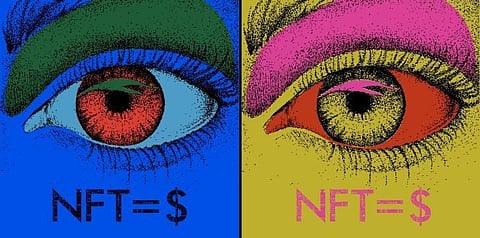Cryptocurrency investors are betting billions on crypto custody providers, which offer security for digital assets. Israel-based Fireblocks became the highest valued crypto-asset custodian in January after it raised $550 million in a new funding round, which increased its valuation to $8 billion. But what is crypto custody and why are investors ready to pour in such huge amounts into it?
Rise Of Digital Assets Like Cryptocurrencies, NFTs Leads To High Demand For Crypto Custody
Safekeeping of digital assets like cryptocurrencies and NFTs worth billions is driving the demand for crypto custodians.
“Crypto custody providers offer services that allow institutional and private players to access and operate on the crypto market and to safely keep and use their funds. Investment banks, hedge funds, asset managers... are exploring the custody market driven by strong customer demand, (and) therefore we will see more crypto custody providers joining the market,” says Oriol Caudevilla, co-leader of the central bank digital currency (CBDC) and Blockchain Working Group at the Global Impact FinTech Forum.
What are virtual digital assets? Read here to find out.
What Is Crypto Custody?
Digital asset custody providers offer safekeeping and protection to a customer’s crypto assets, including managing a client’s private keys or related custom solutions from a technology provider. Crypto custody involves storage, processing and security measures put in place to ensure maximum protection while reducing risk from potential theft, hacks and other forms of misappropriation.
According to a January 2022 report of investment firm Blockdata, since the beginning of 2019, assets under custody (AUC) have grown 600 per cent. The same report further noted that digital asset providers have raised $4,577 million as of January 2022.

Various entities such as Coinbase, Paypal, Genesis and Gemini have acquired crypto custody infrastructure companies to enhance their security for crypto assets and offer new services.
“Crypto custody is the missing link between web2.0 and web3.0. It is, therefore, important to create seamless user onboarding experiences for non-crypto native folks to enable mainstream adoption of crypto. The recent phishing attack on OpenSea NFT (non-fungible token) marketplace, which resulted in a loss of more than $2 million worth of NFTs, highlights the importance of having the right education with respect to custody of digital assets," says Sharat Chandra, vice-president, research and strategy, EarthID, a global decentralised self-sovereign identity management platform.
Read about the OpenSea attack here.
Why The Need For Crypto Custody?
With the cryptocurrency market expanding, the value of crypto assets goes hand-in-hand with safe and secure storage options as they are increasingly becoming attractive targets for hackers and theft.
The Blockdata report points out that in the light of recent events, such as the $196 million-Bitmart exchange hack and the $97 million-Liquid exchange hack, the importance of storage is an ongoing concern for the industry. Safely storing the assets with a custodian can make the job of key management easier. With a professional custodian taking this responsibility, investors can get relief from many of the general risks associated with self-storage.
“The digital wallets and custodies are designed to address safety concerns surrounding cryptos. Wallets are for one and all, while crypto custody services are primarily for institutional investors, including hedge funds and those holding large amounts of Bitcoin or other digital tokens," says Edul Patel, CEO and co-founder, Mudrex, a crypto investment platform.
In 2021, Chainalysis had reported that approximately 20 per cent of all existing Bitcoins appear to be in lost wallets, worth $205.8 billion as of December 2021.
Despite claims of secure digital wallets (hot wallets; connected to the internet), they are attractive targets for hackers. So, custodians provide investors with more secure, regulated and off-line (cold wallets; not connected to the internet) storage options to mitigate these risks.
About 10 per cent of all cryptocurrency (worth $247 billion as of December 2021) is currently stored by eight custody service providers, the report states. The eight providers are Coinbase, Bitgo, Fireblocks, Gemini, Ledger, Matrixport, Nydig, and Bitcoin Suisse.
How Is Crypto Custody Different From A Digital Wallet?
A custody platform solution entails opening an account and then letting the platform manage and secure the digital assets. Digital wallets are geared towards individual users, and users are responsible for safeguarding their assets and digital wallets.

Does India Have Crypto Custody Providers?
As of now, India does not have any custodial wallets. “In the current system, there are no major custody solutions in India. Either you have your digital assets on an exchange, on a cold wallet like Metamask or other crypto wallets. You have to be extremely careful with these. Or, you are on a hardware wallet like Ledger nano, which offers you more security checks and limitations than a cold wallet, which makes them safer but not the easiest to use,” says Prashant Malik, general partner at Tykhe Block Ventures, an investment firm.
Striking the correct balance between usability and safety is a challenge for digital asset custodians. “Cyber security is another challenge, given the online nature of digital assets and their vulnerability to hackers," says Patel.
According to some experts, most crypto exchanges offer default custody models on their own online wallets so there is almost no demand for crypto custody providers. “The default custody models for most crypto exchanges is to offer their own online wallet, and this is a service embedded into their primary service. The custody responsibilities place the onus on the custodian for the security and safekeeping of the crypto asset, and exchanges have in the past been the target of hackers who have been able to break in to steal cryptocurrency,” says Harish Prasad, head of banking at FIS. He further noted that the regulatory compliance related to anti-money-laundering laws will likely extend to any entity offering crypto-custody services in India as well.

Is India Ready for Institutional Custody Of Digital Assets?
Vikas Ahuja, CEO at CrossTower India, a crypto exchange, says institutional custody of assets is more secure. “Institutional custody of assets is more secure since custodians add an extra layer of security to wallets. Some even get their wallets insured.” Some wallets have a combination of cold and hot wallets.
At the same time, says Purushottam Anand, advocate and founder of Crypto Legal, a blockchain law firm, “It is extremely important to regulate the companies that provide ‘custody’ services for cryptocurrencies. Most of the crypto exchanges in India keep the custody of cryptocurrencies with themselves and technically also provide ‘custody’ services to the investors."
Compared to physical assets, virtual digital assets are more susceptible to cyber theft, cyber fraud or even incorrect blockchain transactions. “There is, however, no specific regulation with respect to the minimum standard of technology and security to be maintained by these exchanges, which exposes investors to unlimited risk in the unfortunate event of loss of these assets from the custody of the exchange," says Anand.